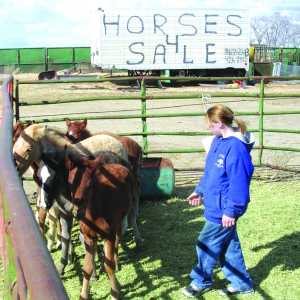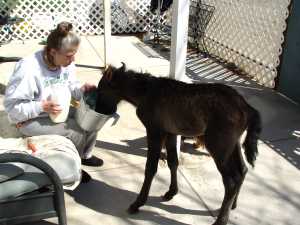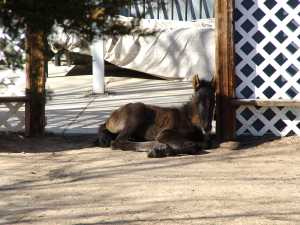|
Rumor Control Story
|

|
Fallon, NVFallon is home to a couple of significant livestock auctions. Many animals are traded there. Some of those that aren't of particular value to auction goers go to the kill buyers. In some cases, local horse dealers and private individuals save an occasional prospect that they think they is good enough for them to recover their money.Local wild horse volunteers became aware that a number of very young foals had been brought to an established local consignment dealer. A couple of these foals were so young that their umbilical cords were still dangling. According to witnesses, a transporter had picked up a few loads of mares and foals from the Pyramid Lake Paiute Reservation. They went to one of the auction yards in Fallon where the mares were purchased by a reseller who shipped them to Canada and a slaughter dealer. Apparently some foals were trampled to death in transit. The surviving foals would up at a consignment dealer. There was no milk provided for the foals and they were placed in a corral during a terrifically windy night. Witnesses reported that the consignment dealer had some grass hay and spread it out along with some grain and sprinkled some milk replacement powder over it. Volunteers showed up the next day and purchased the foals from between $150.00 and $300.00 apiece, depending upon size and color. Some of the foals were pretty weak. A couple were revived with milk replacer infused every couple of hours with a turkey baster. Two required IV fluids and supervised veterinary care. The remainder could drink from a bucket. |
LRTC Adoption Program Manager Shirley Allen feeding "Moe" from a bucket.Moe was one of several foals personally purchased by Stagecoach volunteer Carol Valles. Moe came in pretty weak and needed constant "nursing" using a turkey baster for the first 24 hours. |

|
|
The State Division of Livestock Identification and Investigation was notified and they immediately dispatched an investigator to try to figure out where the foals came from, how this situation arose and if any state laws were broken. There were brand certificates issued for the foals so their movements were traceable.
The driver apparently pleaded that he didn't organize the load and tried to straighten out the mess at Fallon. He was warned that he would be watched and inspected by NDA inspectors and. If he was ever caught with such a load he would be charged under Nevada's transportation cruelty law, a Class D felony. The State Brand Inspector that issued the certificates for the original load resigned. The consignment dealer was warned by the State Livestock Investigator. Aside from the issue of lack of milk and illegally selling sick animals, the dealer had apparently warned buyers that if they told anyone about the foal situation that the Indians would simply club them to death. These statements were considered to be coercive and potentially fraudulent. Since the foals had been removed from the consignment dealer (by buyers, for their own safety) prior to the arrival of the State Livestock Investigator, this would be a weak case to prosecute. State officials reportedly warned the dealer that they would be watching for similar instances in the future and that any nursing age foals that they acquired had to be properly maintained. There were some concerns expressed that these animals could have been "poached" mustangs. In researching this possibility we uncovered BLM's involvement. BLM informed us that the Pyramid Lake Paiute tribe contracted for the gather. Persons familiar to the area have stated that BLM had pushed horses off of public lands and onto the reservation, in essence giving them to the Indians. The ratonale, according to established sources, is that since there is no established HMA for the free-roaming horses found in the area, the BLM has simply determined them to be estrays. There have also been concerns expressed regarding Indian Nations being assigned sale authority horses. Karen Sussman confirmed that all the signatory nations involved in this project have committed to a resolution that horses are not to be slaughtered for human consumption. While a few tribes have eaten horses, particularly during hard times, most tribes regard the horse as a being of historical and spiritual significance. Thus the return of free-roaming horses to tribes would be considered having more celebratory significance than commercial significance. (Such has been our experience when we were able to get some of the Dann horses turned over to Indian Nations.) It was thought for a while that the mares and foals involved in this incident may have been owned by a private individual who lived on the Paiute Reservation, however the statement from BLM suggests that the gather was done for the Council. Therefore we felt it important to understand what actually happened with these animals.
April 20 Update: Chief Robert DeSoto, an elder in the region, was quite disturbed upon learning about the Pyramid Lake situation. He is helping investigate the matter. It appears that this situation may be far more complex than it appears, therefore I urge people not to speculate about things unknown until such time as we have more answers. Chief Robert feels that one way or another, this incident will be resolved. Additional information will be posted as it is learned.

View Additional Photos of the Foals
Return to KBR Wild Horse and Burro NewsReturn to KBR World of Wild Horses & BurrosGo to other Wild Horse LinksGo To
|